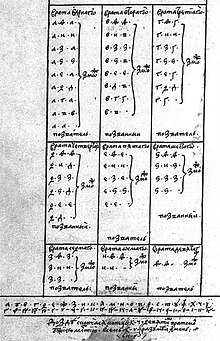Onomancy
Onomancy (or nomancy) is divination based on a subject's name. Onomancy was popular in Europe during the Late Middle Ages but is said to have originated with the Pythagoreans.[1] Several methods of analyzing a name are possible, some of which are based on arithmancy or gematria.[1]

An early example of onomancy is found in the Secretum Secretorum. The system given there involves adding up the numerical values of the letters in the names of two antagonists, dividing the total for each person by 9, and comparing the remainders with a table which predicts the victor.[2][lower-alpha 1]
In Japan, onomancy is known as seimei handan (姓名判断). It can take several forms, but the most popular is based on the character strokes in the subject's written name.[4]
Notes
- Most European versions of the Secretum Secretorum omit the onomancy, but it is present in the Russian translation, a Spanish translation from the 13th century, and one English version which may have been derived from the Spanish.[2][3]
References
- Melton, J. Gordon, ed. (1996). Encyclopedia of Occultism & Parapsychology (4th ed.). Gale. p. 954. ISBN 081035487X.
- Ryan, William F. (1999). The Bathhouse at Midnight: An Historical Survey of Magic and Divination in Russia. Pennsylvania State University Press. pp. 314–316. ISBN 0271019670.
- Burnett, Charles (1992). "The Prognostications of the Eadwine Psalter". In Gibson, Margaret Templeton; Heslop, T. A.; Pfaff, Richard W. (eds.). The Eadwine Psalter: Text, Image, and Monastic Culture in Twelfth-century Canterbury. Pennsylvania State University Press. pp. 166–167. ISBN 0947623469.
- Miller, Laura (2014). "The Divination Arts in Girl Culture". In Roberts, Glenda Susan; Kawano, Satsuki; Long, Susan Orpett (eds.). Capturing Contemporary Japan: Differentiation and Uncertainty. University of Hawaiʻi Press. p. 255. ISBN 0824838688.